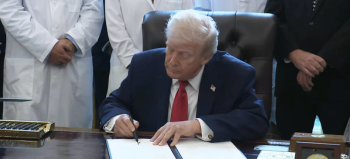
Convincing the Squares: Why Bias, Not Science, Is Holding Back Cannabis Legalization

Despite strong science and widespread legalization, federal cannabis policy remains outdated due to cultural stigma. This blog explains how, in order to shift public opinion and policy, the industry must emphasize safety, standards, and professionalism—especially through practices like cGMP—to convince skeptics.
If you’re in the cannabis industry it is a well-known fact that cannabis is safer than alcohol. It helps children with epilepsy, veterans with post-traumatic stress disorder (PTSD), and people with chronic pain finally get a good night’s sleep. We have data. We have patient stories. We have over 30 states that agree.
So why is it still federally illegal? The answer isn’t science. It’s stigma.
Despite decades of peer-reviewed studies, state-level programs, and positive outcomes, cannabis remains stuck in a bureaucratic gray zone, one where millions use it legally in their state while federal policy still labels it as dangerous and without medical value.
At the heart of this contradiction is a quiet but powerful force: cultural bias. The lingering suspicion that cannabis isn’t legitimate. That the industry is still a bunch of stoners trying to cash in. That regulation and safety are more aspirational than actual.
This is what we’re up against. And to move forward, we have to learn how to convince the squares.
The Stigma Runs Deep
You can’t talk about cannabis without talking about how it became illegal in the first place. Unlike alcohol, which saw prohibition come and go within a generation, cannabis has spent nearly a century in the shadows.
It started in the 1930s with propaganda like Reefer Madness, which painted cannabis users as violent criminals. The War on Drugs in the 1980s and ’90s only made things worse, flooding the media with misleading narratives and disproportionately incarcerating communities of color.
The damage wasn’t just legal, it was cultural. Even today, many Americans still associate cannabis with laziness, irresponsibility, or danger. Never mind the fact that millions of people use it responsibly and for therapeutic benefit. Never mind that it's objectively safer than alcohol and opioids. The idea persists: cannabis is sketchy. And so are the people selling it.
This stigma doesn’t just live in fringe conversations, it shapes policy, influences votes, and clouds public perception. It’s why banks still hesitate to work with cannabis companies. It’s why some doctors won’t even talk about it. It’s why legalization keeps stalling, even when the science is clear.
The Science Is Already Here
The most frustrating part of this cultural lag is that the medical evidence has already arrived, and it's compelling.
Dozens of studies confirm what patients have been saying for decades: cannabis helps. It reduces seizures in children with epilepsy. It improves quality of life for people undergoing chemotherapy (I can personally attest). It relieves pain, supports sleep, and eases anxiety.
The National Academies of Sciences published a comprehensive
The Food and Drug Administration (FDA) has even approved a cannabis-derived drug, Epidiolex, to treat two forms of severe epilepsy.
Yet federal law continues to classify cannabis as a Schedule I substance (alongside heroin and LSD) claiming it has no accepted medical use and a high potential for abuse. That classification has become increasingly absurd.
The real question isn’t “does cannabis work?” it’s “why are we still pretending it doesn’t?”
Who Are the Squares—And Why Do They Matter?
So who exactly are “the squares” that can make a difference?
They’re not a monolith, but generally, they fall into three buckets:
- Policymakers who are risk-averse, politically cautious, or stuck in outdated thinking.
- Voters and community leaders who don’t use cannabis and are skeptical of its value.
- Professionals in healthcare, finance, or education who are open-minded but cautious, waiting for more proof before they throw their support behind it.
These are the people who move the needle. They vote. They donate. They influence public opinion. And right now, many of them are still unsure about cannabis.
That’s a problem. But it’s also an opportunity.
If we can change their minds, not with hype, but with evidence and professionalism. Then we can change the landscape.
How Do We Convince Them? Start with Safety and Standards
You don’t win over skeptics by shouting louder. You win them over by showing them you’re serious. That’s where current
cGMP standards are the same safety and quality protocols set by the FDA and used in pharmaceuticals, supplements, and food production. They cover everything from sanitation and recordkeeping to employee training and equipment maintenance. The goal is simple: prevent contamination, ensure consistency, and make sure the product is safe every time.
For a long time, cannabis companies weren’t required to follow cGMP standards. State regulations varied, and federal guidance was nonexistent. But that’s changing.
In many states cGMP Certification is required to maintain licensing such as in New York, Florida and Maryland. Many companies in states where cGMP isn't yet required are choosing to get certified proactively, so they aren’t scrambling when federal legalization arrives. These are the companies that want to last, the ones building trust with consumers, investors, and regulators, are investing in cGMP certification now. In industries like wholesale food manufacturing, the FDA regulates facilities directly, so third-party cGMP certification isn’t mandatory—but without it, companies are often shut out of major online platforms, national retailers, and international markets. Cannabis will be no different.
Why? Because it shows legitimacy. It says, “We’re not just winging it. We’re operating at the highest possible standard.”
It’s also a way to clearly differentiate from the illicit market or fly-by-night operators who don’t test their products, don’t track batches, and don’t prioritize safety.
For consumers and policymakers alike, cGMP certification is proof that the cannabis industry can be just as safe and professional as any other health-focused business.
Why This Matters Now More Than Ever
Take the recent product recall in Washington State: over 500 batches of cannabis products were pulled from shelves due to concerns about pesticides and residual solvents. These kinds of events are exactly what skeptics fear, and exactly why cGMP matters.
When companies operate without rigorous quality control, mistakes happen. And when mistakes happen in cannabis, they don’t just hurt consumers, they fuel the argument that cannabis is unsafe and unregulated.
The truth is most licensed operators want to do things right. But without consistent standards like cGMP, it makes it easy for bad actors to cut corners or for well-meaning companies to make costly errors.
Implementing cGMP across the board would give regulators peace of mind, protect consumers, and offer companies a clear framework to operate safely. It would also send a powerful message to “the squares”: We take this seriously. You should too.
We’ve Seen This Before: Lessons from CBD and Natural Products
If you want a preview of where cannabis is headed, just look at what happened with CBD.
A few years ago, the market was flooded with low-quality, mislabeled products. Companies were making wild medical claims. Consumers were confused. Regulators were overwhelmed.
Then the FDA stepped in by sending cease and desist letters for illegal health claims, and the market shrank overnight.
Today, the only CBD companies making real profits are the ones that invested early in compliance, quality assurance, and professional manufacturing practices. The rest are gone.
The same thing is happening in cannabis. The companies who build with the future in mind, who adopt GMP, document their processes, and prove their commitment to safety, are the ones who will survive.
And they’re the ones who will help convince the squares.
Changing the Narrative, One Step at a Time
Legalization isn’t just a legal battle. It’s a cultural one. And culture changes slowly, until it doesn’t.
The good news? We’re closer than ever. Public support for cannabis legalization is at an all-time high. More people than ever are open to using it or learning about it.
But to truly tip the scales, we need to keep telling the right stories. We need veterans and parents and patients to speak up. We need responsible businesses to set the example. And we need to keep reminding the world that cannabis isn’t some fringe movement, it’s a legitimate, evolving industry that deserves a seat at the table.
We also need to hold ourselves to a higher standard, even when regulations don’t require it. Because every time a company invests in quality, documents their process, and puts consumer safety first, they’re not just protecting their business, they’re proving a point.
It's Time to Convince the Squares
We can’t afford to wait for federal legalization to catch up. We must lead the way, by running safe, ethical, and transparent businesses that defy outdated stereotypes.
The science is here. The market is ready. The demand is undeniable.
Now we just have to show the skeptics, the policymakers, the voters, the bankers, the doctors, that cannabis is no longer the punchline or the scapegoat. It’s a legitimate tool for health and wellness. It’s an industry worth taking seriously.
And we’re ready to prove it.
About the Author
Kim Anzarut, CQA, CP-FS is the CEO and founder of Allay Consulting. Direct correspondence to:
Newsletter
Unlock the latest breakthroughs in cannabis science—subscribe now to get expert insights, research, and industry updates delivered to your inbox.




